PrAACtically Juneteenth: AAC Ideas for Learning & Celebration
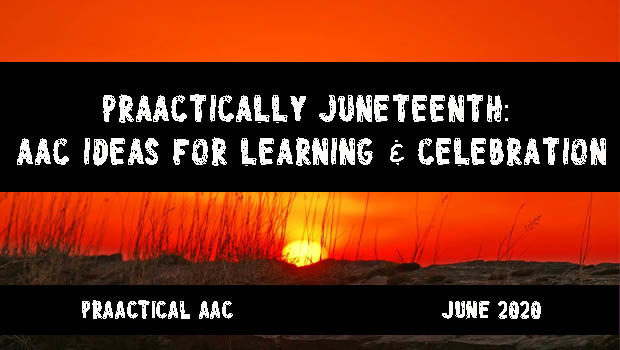
In the US, June 19th is a day that commemorates the ending of slavery. Although the Emancipation Proclamation became effective on January 1, 1863, it took an additional two and half years for it to take root in all of the states. It wasn’t until June 19th, 1865 that Texas became the final state to uphold the proclamation. There are other days that memorialize the freedom of enslaved people, but Juneteenth is the oldest nationally-celebrated commemoration.
Traditionally marked primarily by African Americans, there is a growing awareness of Juneteenth across a broad spectrum of people. In modern times, it has become a day to gather, reflect, and celebrate African American freedom and achievement. In these troubled times, it offers us an opportunity to learn about the history and lived experiences of black Americans, examine our own commitment to build a just society, and challenge ourselves to dismantle racism at all levels.
If you are looking for ways to commemorate this historic event in your AAC work, we have a few suggestions.
Books
Shared reading experiences are a powerful way to build background knowledge and build language and AAC skills. Here are some books to consider adding to your list.
- Lift as You Climb: The Story of Ella Baker
- She Was the First!: The Trailblazing Life of Shirley Chisholm
- The Youngest Marcher: The Story of Audrey Faye Hendricks, A Young Civil Rights Activist
- The Girl With A Mind For Math: The Story of Raye Montague
- Midnight Teacher: Lilly Ann Granderson and Her Secret School
- The Voice That Challenged A Nation: Marian Anderson and the Struggle for Equal Rights
- Nelson Beat the Odds (and Educator’s Guide)
- Wilma Unlimited How Wilma Rudolph Became the World’s Fastest Woman
- The Doctor With An Eye For Eyes: The Story of Dr. Patricia Bath
- The Power of Her Pen: The Story of Groundbreaking Journalist Ethel L. Payne
- Claudette Colvin: Twice Towards Justice
As we read, we can hit the pause button to create teachable moments from the storyline. We can talk about the indignities and microaggressions that come up in the story and how it affects the characters. Beyond calling it out, we can discuss the feelings and emotions, give language for how to respond, and role-play those alternatives. We can relate those to our own lives and discuss situations that are closer to home, too.
Language Experience Surveys
Language experience surveys involve creating a single-question survey designed to give AAC users specific language-building experiences. The AAC user then interviews people in their environment to ask the target question and engage in dialogue. They are a way of creating authentic opportunities to interact with others using language skills that they need to prAACtice. By carefully choosing the topic and question, preparing a visual support to accompany the question, ensuring that the appropriate vocabulary is available, and teaching AAC users how to conduct these interviews, we create a meaningful way for them to get practice with their emerging language skills.
Here are some sample questions to get you thinking about how to implement this for your AAC learners.
- Using prestored messages
- I have a question for you.
- Do you have a few minutes to talk to me?
- What do you think?
- Do you agree?
- Tell me about it.
- I want to hear more about that.
- Core vocabulary focus
- Tell ME about a time WHEN YOU were NOT treated fairly. WHAT DID YOU DO?
- I SAW(SEE) WHAT happened IN ____. WHAT CAN WE DO to make IT better?
- Tier 2 vocabulary focus
- Have you ever faced injustice? (Follow-up: Tell me about that.)
- Did you ever protest anything? (Follow-up: I want to hear about it.)
- Pragmatic discourse focus
- Bid for attention, active listening, contingent responding, terminating the conversation
- Topic maintenance, cohesion
- Beyond requesting
- Commenting: That was a bad idea. I’m sad about this. You did a good thing.
- Rejecting: Stop. I am finished. Don’t do that.
- Asking: Where was it? Who was with you? Why did you/they do that? How did it end?
- Appreciating: Thank you for sharing. I’m happy that you told me.
Vocabulary Collage
Current events are providing an important opportunity to introduce new terms and/or expand AAC learners’ comprehension about words they are hearing on TV, in their daily lives, and in books, movies, and videos. Consider selecting some of those words and creating a vocabulary collage for each one.
To create the collage, you can start with a set of pictures, some of which are positive examples of the new word and some of which are clearly not. We go through this together and discuss whether each one belongs in the collage we’re making for the target word. There is power in that discourse. Talking about WHY a particular picture belongs or does not belong in the collage gives a rich and meaningful context that can help the AAC learner have a deeper understanding of the target word.
Looking for more ideas? Check out this webinar on activities to teach social justice from Teaching Tolerance. You can view the handout here. You can also download their Social Justice Standards for grade-level information that can be used in anti-bias training here.
Also, check out this amazing interactive Google slide by Katriana Kearney that you can use in your e-learning. You can download or make a copy.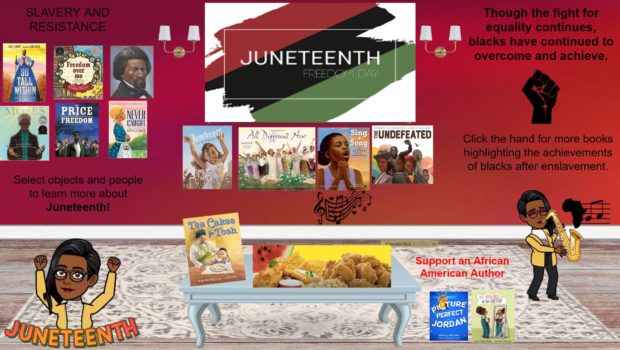
::::::::::::::::::::::::::::::::::::::::::::::::::::::::::::::::::::::::::::::::::::::::::::::::::::::::::::::::::
Postscript: I fully expect that some PrAACtical AAC readers will find the subject matter for this post to be wrong-headed, too political, or not sufficiently related to the field of AAC. A few will be offended and we will part ways. I’m sorry to see you go, but, as my grandmother used to say, “Stand for something, or fall for anything.”
To those on the journey to actively oppose racism and fight for a more just society, I stand with you.
Know justice, know peace.
Filed under: Featured Posts, PrAACtical Thinking
This post was written by Carole Zangari
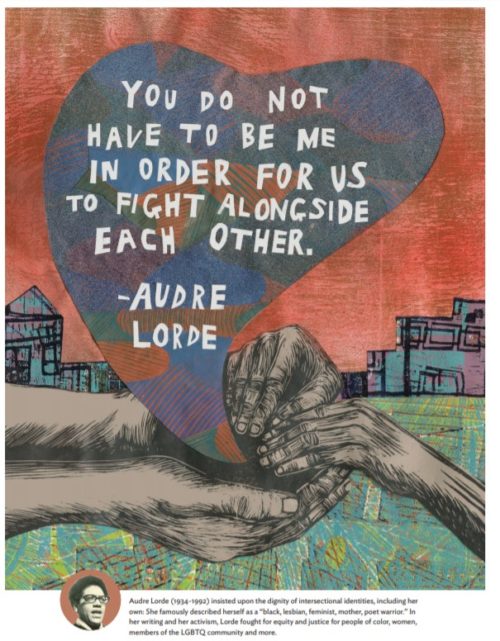

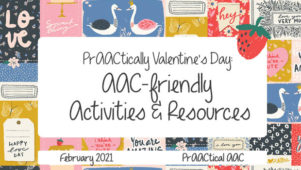
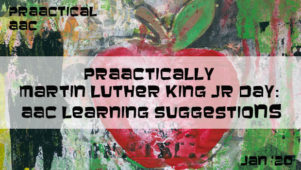
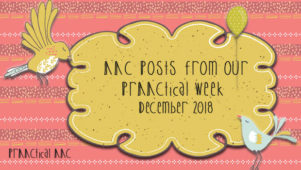
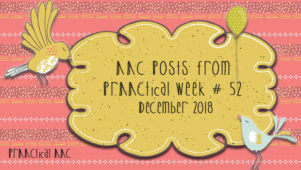
4 Comments
Thank you Carole, these are wonderful resources and ideas!
Thank you for the post and for the wonderful resources + ideas to tie in AAC!
Your grandmother’s quote is spot on. Thank you for your post, the resources, and your willingness to provide education to all of us.
THANK YOU for sharing this.